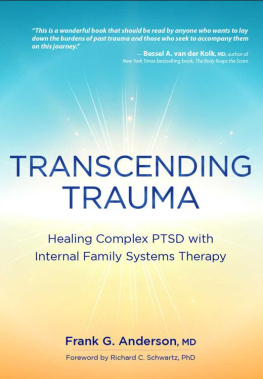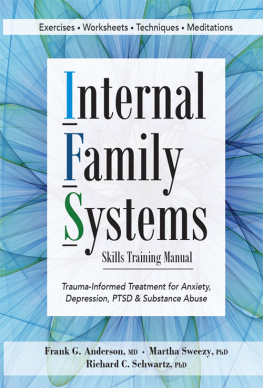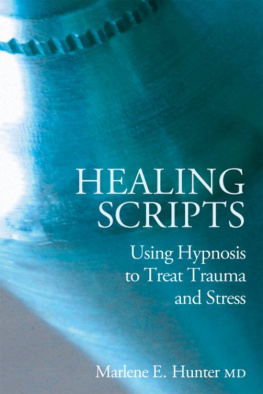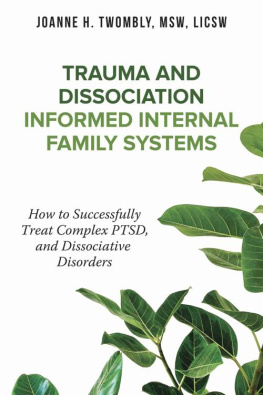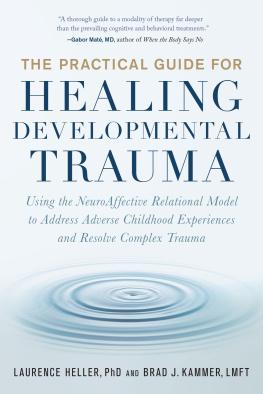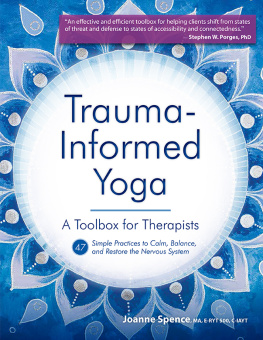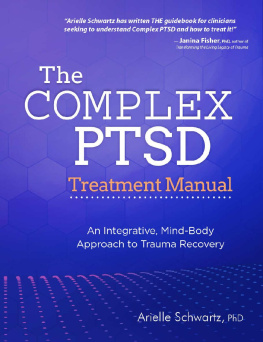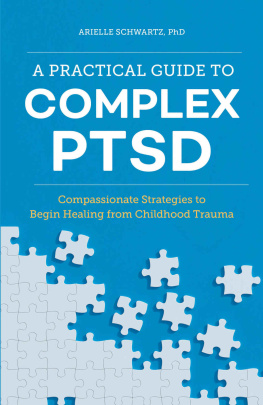Praise for Transcending Trauma
For me, and most of my close colleagues, Internal Family Systems therapy is the fundamental psychotherapeutic approach that we use to help most of our adult patients who deal with the legacy of trauma. It is therefore a gift to all of us that Frank Anderson has written such a lucid, engaging, and comprehensive book that can help us navigate the complicated journey of resolving relational trauma. With the help of exquisite personal anecdotes, Anderson explains the deeper origins of apparently irrational and self-destructive behaviors that people have developed to deal with overwhelming realities. Most of all, he describes how to guide people in reclaiming self-leadership and taking back ownership of their lives. This is a wonderful book that should be read by anyone who wants to lay down the burdens of past trauma and those who seek to accompany them on this journey.
Bessel van der Kolk, MD, President, Trauma Research Foundation Professor of psychiatry, Boston University School of Medicine author of New York Times bestseller The Body Keeps the Score
A crucial contribution that brings clarity and light to the often dark, confusing journey of treating complex PTSD.
Richard C. Schwartz, PhD, founder of Internal Family Systems (IFS)
With his deeply compassionate attitude, Frank Anderson masterfully combines his years of clinical wisdom with the insights of neuroscience to create a definitive work on the treatment of complex trauma with IFS. This is a book that can and should be read by all therapists who work with trauma.
Janina Fisher, PhD, author of
Transforming the Living Legacy of Trauma
In Transcending Trauma, Frank Anderson offers a methodical, clear, and highly instructive pathway to healing complex trauma through IFS, an astute therapeutic approach that is logically presented and generously illustrated with case examples and enriched by personal insights.
Gabor Mat, MD, author of
When the Body Says No: Exploring the Stress-Disease Connection
TRANSCENDING
TRAUMA
Healing Complex PTSD with
Internal Family Systems Therapy
Frank G. Anderson, MD
Copyright 2021 Frank Anderson
Published by
PESI Publishing
3839 White Ave
Eau Claire, WI 54703
Cover: Amy Rubenzer
Editing: Jenessa Jackson, PhD, and Erik J. Martin
Layout: Amy Rubenzer & Bookmasters
ISBN: 9781683733973
All rights reserved.
Printed in the United States of America
Library of Congress Cataloging-in-Publication Data
Names: Anderson, Frank G., author.
Title: Transcending trauma: healing complex PTSD with internal family systems / Frank G. Anderson, MD.
Description: Eau Claire, WI: PESI Publishing, [2021] | Includes bibliographical references and index.
Identifiers: LCCN 2021019781 (print) | LCCN 2021019782 (ebook) | ISBN 9781683733973 (paperback) | ISBN 9781683733980 (pdf) | ISBN 9781683733997 (epub)
Subjects: LCSH: Post-traumatic stress disorder--Treatment. | Psychotherapy patients--Family relationships. | Family psychotherapy.
Classification: LCC RC552.P67 A534 2021 (print) | LCC RC552.P67 (ebook) | DDC 616.85/21--dc23
LC record available at https://lccn.loc.gov/2021019781
LC ebook record available at https://lccn.loc.gov/2021019782

pesipublishing.com
About the Author

Frank Anderson began his professional journey as a chemistry major at the University of Illinois in the pre-pharmacy program. He quickly developed a fascination with the workings of the human body and switched into a pre-medicine program. He happily entered Rush University Medical College, initially wanting to become a pediatrician due to his love of children, but switched into psychiatry after a close family member developed significant mental health symptoms. He was deeply touched by this experience and also keenly aware of the impact it had on others. During his residency program in psychiatry at Harvard Medical School, he noticed that many of the clients struggling with major mental illness had also experienced significant trauma in their lives.
The pain he witnessed in others activated something deep within himself and compelled him to enter into therapy, which quickly connected him to his own trauma history. Becoming a psychiatrist at the Trauma Center in Boston under the direction of Bessel van der Kolk was a natural fit for him, where he learned more about trauma while simultaneously continuing his quest of helping others heal. He was fortunate enough to meet Dick Schwartz at a conference during this time, and his career focus instantly came into full alignment as he was able to integrate his knowledge of neuroscience and trauma treatment with Internal Family Systems (IFS) therapy.
Dr. Anderson is the former chair and executive director of the Foundation for Self Leadership, an organization focusing on IFS research and the expansion of the IFS model beyond psychotherapy. He authored the chapter Whos Taking What? Connecting Neuroscience, Psychopharmacology and Internal Family Systems for Trauma and coauthored the chapter What IFS Brings to the Treatment of Trauma. He also coauthored the book Internal Family Systems Skills Training Manual.
He is a lead trainer and program consultant for the IFS Institute, is an advisor to the International Association of Trauma Professionals (IATP), and maintains a private practice. He is passionate about teaching and enjoys providing psychotherapy consultations, as well as teaching IFS-related workshops throughout the world. To learn more, please go to www.FrankAndersonMD.com.
Dedication
To Austin, Logan, and Michael:
Where life begins and love never ends
Table of Contents
BY RICHARD SCHWARTZ
FOUNDER OF INTERNAL FAMILY SYSTEMS THERAPY
When I began the journey of exploring clients parts that led to the development of IFS, I was a structural family therapist. The late Salvador Minuchin, the father of structural family therapy, was part of a vanguard of therapists who reacted to what they considered the obsessive tendency of psychoanalysts to focus on and ruminate about the products of their clients minds and their histories. The structural family motto was that the past was irrelevant because you could eliminate symptoms and change emotions by simply reorganizing family relationships in the present.
Therefore, as I discovered that my clients had these inner families of parts, I focused on reorganizing the ways their parts related to one another in the present and ignored whatever came up about their pasts. For example, once a client accessed an exiled, terrified young part, I got them to hold and comfort that inner child until it felt safe and calmed down. I then had them let its protectors know they could relax. Clients would leave these sessions feeling much better, but that improvement wouldnt last. In exploring why, I learned from clients that their parts were frozen in past traumas and couldnt fully heal until that was addressed. This was very disappointing to the parts of me that wanted so much to believe that I didnt have to deal with my own traumas and only needed to occasionally hug my own inner children.
However, my protective parts were also scientific and committed to following the data, so they allowed me to begin exploring the impact of trauma on people. I became obsessed with this topic and read everything I could find on it, particularly the work of Judith Herman. This research and experimentation culminated in my coauthoring the book
Next page
